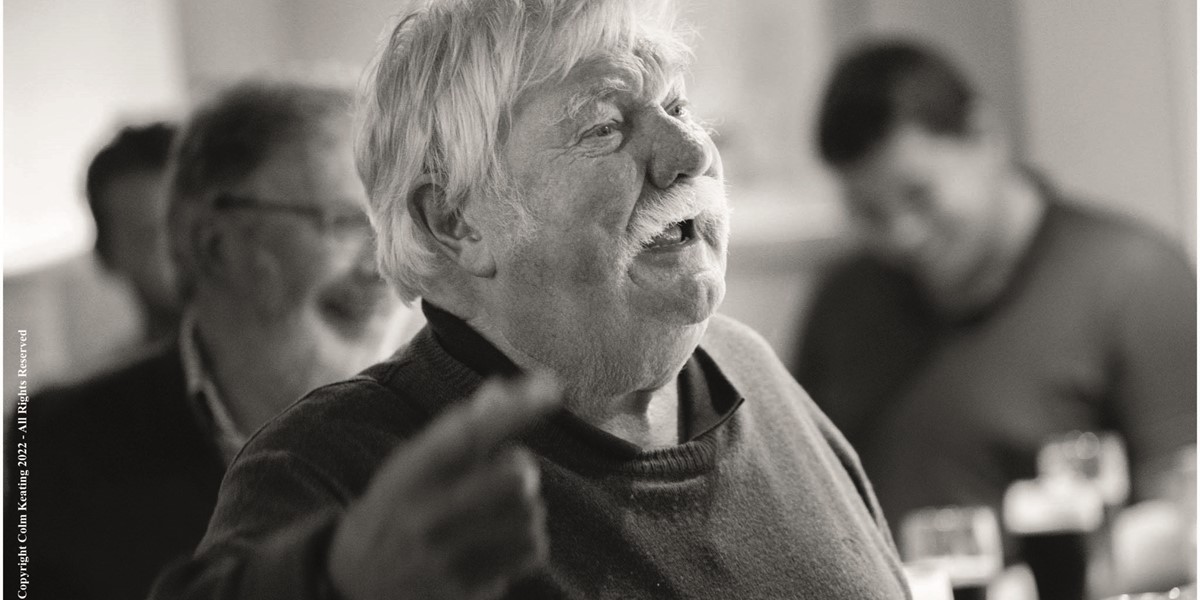Thursday, May 9, 2024
Speaker's Corner: MacDara Yeates on Joe Mulheron
Macdara Yeates pays tribute to one of Belfast’s most beloved singers, songwriters and cultural agitators, known for his generosity as much as his radical politics

Mulheron in 2022 at the Inishowen Singing Weekend / © Colm Keating
This May marks the first anniversary of the death of the great Joe Mulheron, folk singer, songwriter, publican, left-wing activist and member of the Belfast folk group The Men of No Property (later The People of No Property). Few could claim to bring such humour, to perform with such panache, and to speak such truth to power in a lifetime of political folk songs. In a repertoire spanning nearly six decades, Joe covered a lot of ground: the chosen attire of the Palestine Liberation Organisation; an Irish brigadista’s journey across the Ebro river in the Spanish Civil War; the vivid horrors of Derry’s Bloody Sunday; and much more.
Joe Mulheron was born into a Catholic household in Carrick Hill, Belfast in 1947. By the time he reached adulthood, he would find himself in the maelstrom of a city deep in conflict, rife with political fervour and rich creativity. In the late 1960s, he formed The Men of No Property, a ragged band of left-wing folkies who counted traditional singer Dave Scott and cartoonist Brian Moore among their ranks. Responding to their environment, they quickly amassed a catalogue of radical anthems, singing about petrol bombs, rubber bullets and the day-to-day life in what they affectionately termed ‘England’s Vietnam.’ In the early 1970s, they struck a deal with New York’s Paredon Records and released a string of albums with titles like This is Free Belfast! and Ballads from Behind the Barricades, to name a few. Their sleeve notes doubled as Civil Rights scrapbooks, complete with newspaper clippings, satirical cartoons and word-for-word transcriptions of speeches by Bernadette Devlin. To evade persecution (and the tax man), they released the albums under pseudonyms, with Joe taking up the alias ‘Barney Macilvogue’. Their adventures brought them on tours of Ireland, England and further afield. And for a decade, they flew the flag for a practically voiceless community, broadcasting their hopes and fears to anyone who would listen.

Mulheron singing for bandmember Brian Moore and others in his heyday
But Joe Mulheron was much more than a musician. After his years in Belfast, he relocated to Derry and founded the beloved Sandinos Bar, an iconic Ulster music venue and a shrine to radical politics the world over. He became active in the local arts scene, where, among other things, he supported local theatre companies and spearheaded a citywide photography project educating schoolchildren about the Spanish Civil War. Indeed, Joe’s generosity and support were known right across the Maiden City. After his recent passing, Paul Connolly of The Wood Burning Savages remembered Joe as a steadfast champion of independent music, remarking, “He was always eager to give the room upstairs [in Sandinos] for folks putting on their own gigs, of any genre. A giant of kindness.” A spokesperson for the Bloody Sunday Trust organization described Joe as ‘a long-time supporter of the campaign for truth and justice.’
Joe continued writing and performing right up until his death, making regular iconic performances at the Inishowen Singing Weekend, among others. His song, ‘The Free State Adjudicator’, became his calling card, a searing indictment of the judges at the Fleadh Cheoil music festival and their partitionist bias against singers from the six counties of Northern Ireland. In recent years, he took the initiative to record much of his later solo work, with mischievously titled records such as Songs That Nearly Freed Ireland by ‘Macilvogue, Last of The Men of No Property.’ And how lucky we are that he did.
On May 10-12, comrades of Joe’s will meet in Sandinos for a weekend of song in celebration of a great man, one who faced life with humour, humanity and a deep sense of right and wrong. Of all the great bards of The Troubles, Joe was not as widely celebrated as The Wolfe Tones or some of his closer contemporaries, but for those of us lucky enough to make his acquaintance, his presence will be felt, and greatly missed, for many years to come. To quote a line from Joe’s anti-fascist anthem, ‘The Connolly Column’, ‘Who will call the meeting now and who will take the chair? / Who will lead us out on strike and demand an equal share?’ Who indeed?

